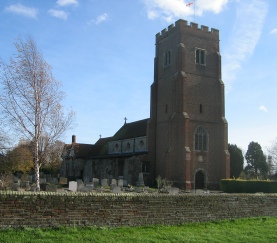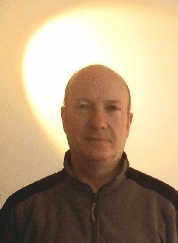








Over years, church leaders come and go. A little while back Alun Hurd came as the Priest in Charge at St, Andrews so we met with him and asked him about his life and life in the Anglican Church. Here is what he had to say.
Meet Alun Hurd, Priest in Charge of St. Andrews Rochford.
(December 2015)
Rochford Life: Alun, I understand you came to Rochford, June last year, and you are priest in charge of more than just Rochford?
Alun: That’s right. I’m also priest in charge of Barling Magna and Little Wakering, and Great Wakering and Foulness, and Rochford with Sutton and Shopland.
RL: That sounds like quite a handful?
Alun: Well yes, until my new colleague, Kim Lepley, arrived on 2nd November I was doing all that on my own and, yes, it was really too much. Kim is technically an associate minister and she lives in Great Wakering. When the ‘pastoral measure’ goes through, I will become team rector and she will become team vicar. She has come straight from a curacy.
RL: Where were you before you came here?
Alun: Australia. I was there for about two and a half years and came back here in 2007. I was ordained in the Guildford diocese back in 1986 and became a curate in Chertsey in Surrey for four years and I was also a hospital chaplain as well. When you come back from somewhere like Australia and you want to continue in the ministry, there are various paths but in fact I knew the previous Bishop of Chelmsford who had been my bishop in Guildford and so I approached him direct but because Chelmsford is so big there are area bishops so I ended up seeing the Bishop of Bradwell and he put the available parishes before me. I chose Great Wakering initially simply because I was keen to go back into a semi-
RL: There are those who suggest that anyone going into the Anglican ministry these days are incredibly courageous because the church is really almost on the fringe of society. How do you feel about that?
Alun: Bearing in mind that a survey has just been published that says 50% of the population don’t consider themselves overtly Christian, yes it is a great challenge and one of the issues for us in the diocese of Chelmsford is that by 2025 I think, nearly 50% of the current clergy will have retired and they are not being replaced in the same numbers. There is the additional issue of funding because parishes are struggling and one of the reasons that I have got the three parishes as priest in charge is because each can’t afford on their own a single priest, so we now have two between three parishes. It is a challenge but just because you are on the fringes of society it doesn’t mean you shouldn’t take up that challenge. And that is what mission is for us. It is to try to make those connections between church, God and the society that we live in. That’s how I see myself really, making the church relevant and God relevant, which is actually more important than making the church relevant.
RL: What has the period of transition been like, coming over here and expanding the number of churches you have to cover?
Alun: Because I had been priest in charge at Great Wakering and Barling and then moving here, where I was specifically asked to look at this appointment, it did require a period of adjustment from the parishes where I had been and even here because they had had a full time priest prior to my arrival. Even now I am not full-
RL: You have used the word mission. How do you go about that?
Alun: Well it is making the church accessible to those you live amongst, making it relevant and using, for example, the occasional offices we share, baptisms, weddings and funerals, as an opportunity to connect with the community and that’s how you begin to get known, and then people see that you are OK and they will begin to trust you. It’s also saying the church isn’t such a bad place, we’re all normal people because they are people from your community. At the end of the day it’s about the people in the community, whether they feel the need for God and if they do it’s about how to maximize that and encourage them to be part of, if not your worshipping community, someone else’s worshipping community.
RL: So presumably part of that is simply letting the community know that you are there?
Alun: No, I think that has for too long been one of the besetting problems of the church, just expecting people to come to them. Now that does still happen with weddings, baptisms and funerals, although that is diminishing of course, but it is a question of how you put yourself out there, and a particular problem here in Rochford is that we are out there on the golf course and so we don’t have the advantage of being a town centre ministry, and that is the real challenge for us and our people there, how do you make that connection, because you can’t rely on the past. When they do come, people who are not established members will come because they see something in the church and in the people that they like and they want, and hopefully a bit of the God bit happening in them
RL: If we may go back to the beginning, what got you into the ministry?
Alun: Well, I was baptized as a baby as most people were, went to church schools, but where I lived as a child, I used to get taken by a lady who used to gather up a whole tribe of children from the street and we were all taken by her to Sunday School. With that plus the church schools influence there was always a connection. Then I was confirmed while I was at secondary school and then that morphed into a church youth club, started going to church, got involved in lots of mainly youth and children’s work, and just felt over a period of time that perhaps God was calling me to something. I thought initially it was youth and community work and so I applied to three colleges, but although I had very good references and CV I didn’t get accepted. Then one evening my vicar was preaching on Isaiah chapter 6 where God says, “Who shall I send?” and the prophet Isaiah says, “Here I am send me,” and I felt that speak very deeply to me and that set off a chain of events over a period of time which resulted in me going off to theological college and here I am! Mind you, no one was more surprised than me that when I went to the selection conference, that I got chosen. I wasn’t expecting it.
RL: From what you’ve been saying earlier on I get the impression that your attitude towards the world out there is, I’m here for you. Is that right?
Alun: Yes, If you feel there is a need to talk with me or there is any way I can help you, with reason, I am available for you. I have been involved in lots of chaplaincy work; I am currently an army chaplain, I am the senior padre for Essex Army Cadel Force and I do what I can for them. I never talk about religion, they talk about it, and in the same way I don’t go up to anyone and talk about religion. I can be a friend in the community, whatever that means for them and so I think my job is to be available for people as much as they want or need. I’m the chaplain to Rochford District Council and so I go and say prayers for their main council meeting, I go into Rochford Primary School and I’d like to make other connections that way. We have connections with the Scouts and the Army Cadet Force, I go to the Town Team Meetings when I can, to try and make those connections because I believe the church is part of the community because all the people who come to our church live in this place. I’m a pretty ordinary person and I play in a local rock band and do regular local gigs and we were the band that played on the afternoon of the turning the lights on in Rochford. I also support Tottenham football club.
RL: Well perhaps we should draw a curtain across your murkier associations before you go any further!!!! Alun, thank you so much for sharing so fully and giving us such a clear picture of life in the local ministry in the Anglican Church here today. Thank you again for your time.